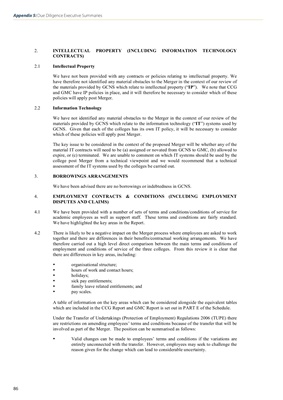
Appendix 5: Due Diligence Executive Summaries
86
2. INTELLECTUAL PROPERTY (INCLUDING INFORMATION TECHNOLOGY
CONTRACTS)
2.1 Intellectual Property
We have not been provided with any contracts or policies relating to intellectual property. We
have therefore not identified any material obstacles to the Merger in the context of our review of
the materials provided by GCNS which relate to intellectual property ("IP"). We note that CCG
and GMC have IP policies in place, and it will therefore be necessary to consider which of these
policies will apply post Merger.
2.2 Information Technology
We have not identified any material obstacles to the Merger in the context of our review of the
materials provided by GCNS which relate to the information technology ("IT") systems used by
GCNS. Given that each of the colleges has its own IT policy, it will be necessary to consider
which of these policies will apply post Merger.
The key issue to be considered in the context of the proposed Merger will be whether any of the
material IT contracts will need to be (a) assigned or novated from GCNS to GMC, (b) allowed to
expire, or (c) terminated. We are unable to comment on which IT systems should be used by the
college post Merger from a technical viewpoint and we would recommend that a technical
assessment of the IT systems used by the colleges be carried out.
3. BORROWINGS ARRANGEMENTS
We have been advised there are no borrowings or indebtedness in GCNS.
4. EMPLOYMENT CONTRACTS & CONDITIONS (INCLUDING EMPLOYMENT
DISPUTES AND CLAIMS)
4.1 We have been provided with a number of sets of terms and conditions/conditions of service for
academic employees as well as support staff. These terms and conditions are fairly standard.
We have highlighted the key areas in the Report.
4.2 There is likely to be a negative impact on the Merger process where employees are asked to work
together and there are differences in their benefits/contractual working arrangements. We have
therefore carried out a high level direct comparison between the main terms and conditions of
employment and conditions of service of the three colleges. From this review it is clear that
there are differences in key areas, including:
• organisational structure;
• hours of work and contact hours;
• holidays;
• sick pay entitlements;
• family leave related entitlements; and
• pay scales.
A table of information on the key areas which can be considered alongside the equivalent tables
which are included in the CCG Report and GMC Report is set out in PART E of the Schedule.
Under the Transfer of Undertakings (Protection of Employment) Regulations 2006 (TUPE) there
are restrictions on amending employees' terms and conditions because of the transfer that will be
involved as part of the Merger. The position can be summarised as follows:
• Valid changes can be made to employees' terms and conditions if the variations are
entirely unconnected with the transfer. However, employees may seek to challenge the
reason given for the change which can lead to considerable uncertainty.